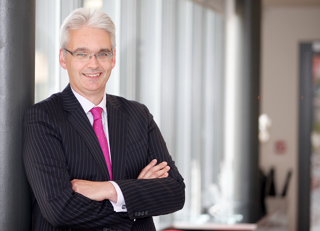It’s been a good year for Hitachi Capital Vehicle Solutions (HCVS). The vehicle leasing company reported strong growth and was named Leasing Company of the Year – 20,000-plus vehicles – for the third successive year at the Fleet News Awards.
Despite the fleet industry being hard hit by the pandemic during the past financial year (2020/21), profit before tax was £19.7 million, compared with the £25.7m achieved for FY19/20.
It now operates a fleet worth £1.2 billion, a 24% year-on-year increase, securing its number seven ranking in the FN50 with a risk fleet of almost 78,000 cars and vans.
However, that growth could have been higher still if Hitachi, like the rest of the vehicle leasing industry, was not having to endure long lead times for new product, because of the semiconductor shortage.
Jon Lawes managing director at HCVS, says that there is a high demand for both new cars and commercial vehicles from its fleet customers.
“The economy is thriving and it’s the responsibility of us all (in the industry) to furnish those customers, because it’s those new, bigger fleets that turn the wheels of UK plc,” he explains.
However, with demand outstripping supply, Lawes admits: “The current situation is quite frankly limiting growth.”
It’s been a good year for Hitachi Capital Vehicle Solutions (HCVS). The vehicle leasing company reported strong growth and was named Leasing Company of the Year – 20,000-plus vehicles – for the third successive year at the Fleet News Awards.
Despite the fleet industry being hard hit by the pandemic during the past financial year (2020/21), profit before tax was £19.7 million, compared with the £25.7m achieved for FY19/20.
It now operates a fleet worth £1.2 billion, a 24% year-on-year increase, securing its number seven ranking in the FN50 with a risk fleet of almost 78,000 cars and vans.
However, that growth could have been higher still if Hitachi, like the rest of the vehicle leasing industry, was not having to endure long lead times for new product, because of the semiconductor shortage.
Jon Lawes managing director at HCVS, says that there is a high demand for both new cars and commercial vehicles from its fleet customers.
“The economy is thriving and it’s the responsibility of us all (in the industry) to furnish those customers, because it’s those new, bigger fleets that turn the wheels of UK plc,” he explains.
However, with demand outstripping supply, Lawes admits: “The current situation is quite frankly limiting growth.”
Hitachi’s strong financial performance has been helped by a strong order book in 2020, which it was able to capitalise on before the semiconductor shortage bit.
“We managed to get in there early, but I think this problem is going to continue into 2023,” he says. “I can’t see it being solved in 2022 and I don’t think it’s going to get back to how it used to be. This is kind of the new normal and it’s putting pressure on fleet discounts.
“The key challenge for all leasing companies and end-user customers is that their operating costs are going to be very different.”
Fleet News: How are you going to mitigate any potential increase in costs for fleets?
Jon Lawes: We have to think differently. Our customers rely on ourselves to help them drive down costs.
For instance, we’re looking at the lifecycles of vehicles; should we replace them at three years or if they’re going to be more expensive, should we have a longer lifecycle?
Electric vehicles (EVs) will last longer than combustion engines so have we got that right?
We’re being very open and transparent with our customers about what the challenges are, and our customers are very understanding. They know it’s not just an issue for Hitachi, it’s a global problem.
FN: Are you extending contracts to manage new vehicle supply pressures?
JL: Economically, it would be better if we didn’t extend vehicles; in the current market, we’re better off selling them.
But the ultimate goal is to serve your customers, so we’re not pulling vehicles back to profiteer from the current used car market; we’re very much supporting our customers and putting in plans to extend where we can’t get replacement vehicles.
FN: What can fleets better do to manage their replacement cycles?
JL: A lot of organisations have a 12-month (fleet) programme, especially in the commercial vehicle market where they’re ordering in batches, but my big message would be you should be ordering 2023-24 vehicles before Christmas.
You have to be sharper at planning and understanding what’s going on in your business. It puts a lot of pressure on businesses that have had a tough time over the past 18 months, with a lot of uncertainty.
Who wants to order vehicles for two years’ time when they’ve had the 18 months they’ve had? There are some real challenges for business.
FN: What are the challenges around electrifying fleet operations?
JL: Some 65-70% of our orders are for battery electric vehicles. The current regime is working whether you talk about taxation policy or company car policies.
We’ve changed all the policies for our customers over the past couple of years to really drive ULEV (ultra-low emission vehicles) or battery electric vehicles only.
The challenge is supply because the demand for EVs is outstripping the supply. Our order bank has just doubled.
We’ve also created a dedicated team which specialises in helping to provide solutions to customers around their (electric vehicle) charging. Whether that’s a depot charging solution – we have a full turnkey solution where we can provide charging infrastructure at depots – whether it’s workplace charging or transactional home-based charging, or even solutions around the public charging network.
That’s where we’re taking our business, really evolving a total solution, including the refuelling options. It’s the biggest barrier to the mass adoption of EVs apart from their supply.
We think there’s a real opportunity for our business to expand into that refuelling solution by providing that total solution to our customers. That is what they’re worried about, my role is to help them solve that problem.
FN: We have seen record electric car registrations, but what success are you having with fleets adopting electric vans?
JL: We’re having a lot of success with car-derived electric vans. The uptake and demand are very strong. For 3.5-tonne vans, the demand is also really strong, but there is only really one or two products at the moment that can serve that market and they’re very expensive.
In terms of the mid-sized panel van such as the Vivaro-e, we have that working from a total cost of ownership (TCO) perspective.
FN: Do you think that the ban on the sales of new petrol and diesel vans from 2030 is achievable given the lack of electric variants in the large
van market?
JL: I think it’s very much achievable. I thought at the start of the pandemic it may just slow people’s appetite around EVs, because they would have more operational things to focus on. How wrong I was. We’ve seen more progress during the pandemic than we have ever seen.
It’s about fleet managers having the courage. If you’re a fleet manager, would you want to be the last company running diesel vehicles?
The sooner you start trialling an EV, the sooner you will start learning how you can use EVs.
All of our staff have gone through an EV academy, which is externally accredited. They’ve done that for cars and now we’re doing it for vans as well.
New name from February – Novuna Vehicle Solutions
Hitachi Capital Vehicle Solutions has announced that it will rebrand under the new trading name of Novuna Vehicle Solutions in February 2022.
At the same time, parent company Hitachi Capital (UK) will change its legal name to Mitsubishi HC Capital UK, following the merger earlier this year of Hitachi Capital Corporation with Mitsubishi UFJ Lease and Finance Company, forming Mitsubishi HC Capital.
The rebrand to Novuna, which means ‘new together’, marks the start of an exciting era as the business accelerates its growth plans under its new parent company, says Lawes.
“Customers will see more investment in decarbonisation; they will see more investment in delivering a great customer experience,” he adds.
Each of the other business divisions within Hitachi Capital UK will also operate under Mitsubishi HC Capital UK’s Novuna trading name, including Novuna Consumer Finance, Novuna Personal Finance, Novuna Business Finance and Novuna Business Cash Flow (previously Invoice Finance).
The European division will adopt the Mitsubishi HC Capital trading name as part of its collaboration with the parent company, Mitsubishi HC Capital.
The change, it says, indicates an evolution from a manufacturing-based heritage to a new global financial powerhouse with the scale and expertise to drive change for business partners and consumers.
The backing of Mitsubishi HC Capital aims to provide Novuna with the opportunity to leverage the size, scale and expertise of its new parent company in order to realise the company’s ambitions.
The new name is the first stage of the business’s transformation.
Judges' comments
A true car, van and truck leasing provider, Hitachi offers forward-thinking support for customers, including its electric vehicle charging scheme and excellent downtime management. It displayed clear evidence of its fleet assistance during Covid, while by aligning its products and services to its customers’ strategies, Hitachi can react swiftly to understand and meet their priorities. A model of consistency across every part of its business.
Login to continue reading.
This article is premium content. To view, please register for free or sign in to read it.




















Login to comment
Comments
No comments have been made yet.